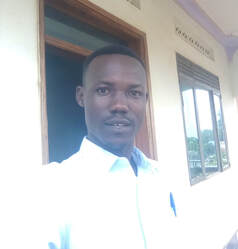 Isaac Cosmas Isaac Cosmas In this episode of Finding the Helpers, we had the pleasure of speaking with Isaac Cosmas, a South Sudanese refugee who Playing to Live met while conducting a mental health needs assessment in Rhino camp, a refugee settlement in Uganda. Isaac was there as both a refugee and working as part of the frontline staff providing supporting the mental health needs of other refugees. In his interview, Isaac shares with us his story of struggle, resilience, and brings to light the hardships facing refugees during a global pandemic. Isaac was born during the second Sudanese civil war which had broken out in the early 1980s. This conflict lasted for almost two decades and was based in the same cultural, religious, and language differences of previous conflicts between Sudan and South Sudan. Due to this conflict, Isaac spent the first portion of his life within the same village he was born in. Isaac described always being driven toward education. That learning was a top priority for him, but that in his village school did not go beyond primary school and most of his teachers had not completed anything beyond primary school themselves. He says, “We never had any hope for progressing in education, or getting exposed to the world, or associating with people of different cultures because we never had the chance of interaction. The village that I was living in was the whole world that I knew.” It wasn't until The Comprehensive Peace Agreement was signed in 2005 that he got the chance to venture beyond the borders of his village. The South Sudanese could finally travel, obtain education, and meet new people outside of their villages. Isaac seized that opportunity to move to Uganda where he began pursuing higher education, eventually receiving a diploma in Religious studies. Once he obtained this degree, Isaac was able to created a livelihood for himself and his family in South Sudan. He describes himself as a "dibiti parent," a term they jokingly use in his country for first borns who are the first to leave their villages and obtain education. He explains that in such a conflict-ridden country, all their parents lived during war and crisis and have no savings or means to provide for their children. So it becomes the responsibility of the first born to provide food, clothing, pay for education, and even provide parental guidance. He provided these things for 12 family members by working in development and farming. He describes this period as a time when they finally had hope that the conflict would be over. They had hope for a future without suffering. Unfortunately, however, another conflict broke out in 2013, and again in 2015. In this conflict, paranoia from the government that Isaac was feeding rebels with his produce, and a similar distrust from the rebels, lead to his produce being confiscated, leaving him with no income. As a result, Isaac had no choice but to move his entire family to the refugee settlement in Uganda. Of about 1.4 million refugees in Ugandan settlements total, about 848,000 are South Sudanese. Isaac describes the uphill battle the South Sudanese face when arriving in Uganda as a result of not being as exposed to the world and to education as Ugandan people. He says he brought one idea with him to the settlement, “We have to beat all odds. We have to continue beating the odds. The benefits of life that come easily, we have to get to the hard way. We have to turn it around to make it succeed." Isaac did beat those odds, and was the first South Sudanese person in Rhino Camp to obtain a higher professional status when he began working for the Danish Refugee Council. He worked to reduce vulnerabilities facing adolescent refugees, and eventually helped to some of his fellow South Sudanese get jobs. He was working and earning a salary, but still faced difficulties, “While trying to solve other people’s problems, we have our own to solve for ourselves." He explained that as refugees themselves, most of the front line staff had their own families living in the settlement and had also lost their property, livelihood and often family members in the conflict that led them to flee. Additionally, his salary allowed him to take care of his family, but because he had always grown up surrounded by his community, also left him feeling guilty, “I feel bad that I can buy things, like meat, that other people cannot afford. My neighbor cannot afford these things, and this is what many refugee frontline staff face.” The pandemic has made things even more difficult for refugees. Refugees rely almost 100% on humanitarian assistance, and with many donor organizations having to focus their funding on their own countries dealing with COVID-19, they can no longer count on this relief in refugee camps. In April there was a major food rations cut, and in total about 30% of donor funds have been suspended. Isaac explains that to obtain necessarily survival essential, refugees also rely on trade. On walking around the settlements and interacting with one another, which has all been halted due to the lockdown. Furthermore, refugees do not have access to reliable enough internet access to receive updated news around COVID-19 and with many organizational standards lowered due to lack of funding, the staff who used to come in with that information no longer has access to it either. Isaac spoke extensively about the front line staff in these settlements. There is almost no mental health support for frontline staff in Rhino Camp and on top of trying to support the other inhabitants they are also now often isolated from their own families due to lockdowns and travel restrictions. Isaac himself is currently stuck in South Sudan and has no idea when he will be able to return to Uganda to be reunited with his family. He shared that he was present to see his daughter's birth in December but has not seen her since. Aside from all the aforementioned added stressors of this pandemic, Isaac explained that his country and those like it often take cues of what to do in global crisis from Western culture. He says, however, that in a country torn apart by war where most citizens are starving or at risk of severe malnutrition, the approach of shutting down the economy, like we originally did in the United States and Europe, will not work. “People are facing the choice of “die of hunger or die of COVID-19”. Highlighting the need to customize how we approach crises in each country, especially those that are not represented well in global decision making.
Isaac says despite knowing and seeing that the strain related to COVID is continually getting worse, he reports that there is little to no access to testing so it is unclear how much the virus has actually spread. He shared that the hospitals are over capacity, and the shocking fact that South Sudan only has 4 ventilators in the whole country. 4 ventilators in a country of almost 11 million people. Additionally, there is little personal protective equipment available to any of the medical staff. Even without a pandemic, in addition to an already weak medical infrastructure, civil servants, nurses, and midwives do not make enough in a month to buy even 100 kgs of rice. Their payments are also often delayed up to three months at a time, resulting in significant stress beyond the virus. And due to a lack of cohesive communication by leaders, many South Sudanese are not adhering to the guidelines set forth which in turn will put even more pressure on this health care system and it’s workers. In the face of all of this, Isaac and his community are still pushing through. “We still have the hope. And we’re not losing the effort. But I’m quite sure that after this pandemic people will face more serious mental health issues than food and clothes. And it might even kill more people than what COVID-19 is killing.”
0 Comments
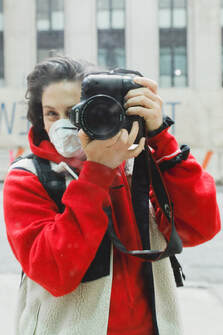 Laura Fuchs out capturing smiles Laura Fuchs out capturing smiles In the midst of what feels like each day brings more challenges and unveiling more hard truths, our episode this week is dedicated to recharging through moments of hope, grace, and connection. Sometimes people add to our collective strength in completely unexpected and yet completely necessary ways, and we are thrilled to have found one of those people. Her name is Laura Fuchs, and she is a photographer living in New York City. We found her after her “Mask Smiles” project was featured in an article by BBC, which you can find here. With a degree in psychology from Barnard, and about ten years of photography experience, Laura brings incredible empathy and connection into her art. She shares that she is completely in the moment when taking a photo of someone and how special it is to then give that person their photo. “Photography is 100% therapy for me. It’s my favorite thing.” She encourages everyone in her life to pick up a camera, “It’s an amazing way to document your life, seek comfort in other people or inanimate objects, connect with yourself, and have it reflected back to you.” When the pandemic hit, Laura realized as she walked around New York City that not only did people seem scared, but they weren't even looking at each other anymore. In response to that, she found herself trying to smile at people through her own mask. One day with a passing stranger's returned "smize", she realized that despite masks, smiles could still be acknowledged, and returned, and that felt really special to her. She began trying it out on a few people by asking if she could photograph them smiling behind their masks and “Mask Smiles” was born. “It’s so rewarding to feel as though I’ve kind of re-empowered people with their smile.” Laura shares passionately that this project is not to make light of how hard this time is. Not everyone can smile right now, and she is aware of and respectful of that. Sometimes she meets rejection on the street and acknowledges that her positive energy is not always equal to where people are and explores the idea of how powerful it can be to plant seed for those people in this time. To help people understand, whether they are in a place of deep grief and fear, or whether they are afraid it’s inappropriate to smile at a time like this, that smiling is not an invalidation of how hard this time is. Reminding us “These are smiles of resilience, these are smiles of strength.” And that in the face of all this trauma, it can biologically change your state to even force a smile. Laura shared some of her favorite moments of the project so far ranging from finding a woman in Chelsea who sits on a bench yelling expletives at people not wearing masks, to a day where she experienced the spectrum of first being turned down by an obviously grieving healthcare worker before going on to encounter a larger than life “fabulous” cross town bus driver who enthusiastically participated in the project. She shared a moment of finding a mother and daughter jumping in puddles and emphasized the beauty of seeing people doing regular things. She explored her wonder at the impact this is having on kids by sharing one last story about a family she photographed with young children. Upon approaching and explaining the project to the parents, the mom turned to the kids and said “Guys we were just talking about this, about how you can still see other people’s emotions through masks.” Through all of this, self-care is also really important to Laura. Besides photography, bike rides are her therapy, she says, “It feels so good to move.” She’s also been cooking a lot and watching bad TV. Her confession of bad TV led her to stress how important it is right now to not judge ourselves, “Just do your own thing, don’t judge your progress or lack of productivity. Give yourself a pat on the back for even making it through this period.” In her parting words she leaves us with a simple encouragement to smile. That a simple smile can give you a moment of feeling strong, in control, and centered. On top of that, she urges us to give someone else a smile. Reiterating that we never know what someone is going through, and that while we should be prepared for rejection, the potential for something positive is so much greater than any consequence of a rejection. “It’s good for people to see that they’re allowed to smile right now, it’s good for people to see that they’re allowed to find joy. And more importantly, to me, I think it’s a time to dig deep to find joy. Find that joy.” 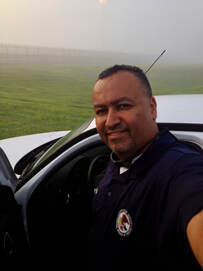 Joe Rojas Joe Rojas As our country continues to fight COVID-19 and racial inequities every day, we want to acknowledge how hard this time is for so many people. We have struggled to figure out how to proceed with this project in a way that values and prioritizes both battles. Our mission in starting this podcast was to highlight people who are working to improve our world by caring for others, and in this time of great turmoil, we feel the stories we have collected from those on the front line of COVID-19 will continue to add to a greater sense of healing and prioritizing of self care, and we are excited to continue to share them with you. In this episode, we interview Joe Rojas on his experience of the prison system’s response to COVID-19. One of the reasons we wanted to investigate the prison system during this pandemic is because the conditions in prisons make containing an infectious disease inherently difficult. This pandemic has disproportionately affected people of color, and with people of color making up a disproportionate percentage of the prison population, one of the things we learned from Joe is that prisons are yet another space where vulnerable populations are disproportionately affected by this virus. Joe is a member of law enforcement. He has been a corrections officer in the prison system for 25 years, and he refers to himself and other guards, as the "forgotten law officers." We realize that law enforcement is a very loaded term right now and is at the center of this long and current battle for racial justice. Joe is passionate about advocacy and one of his main missions is to make sure the inherent hazards in the prison system are lowered, and that management upholds their end of the bargain to help make that happen. Joe explains his journey from corrections officer, to eventually getting promoted as a teacher where he focused on helping inmates with GED testing, job fairs, interview skills, resume building, and social skills. In 2005 Joe became a union official, moving up from union president to regional vice president for the southeast region where he now oversees 17 institutions. He acknowledges that working in a prison brings inherent hazards with it, but that his main goal is to prioritize safety. Joe explains that there is approximately one officer for every 128 inmates. That there are a lot of assaults, including staff assaults. He shares that having worked in the prison system for 25 years, he has established bonds with many of the inmates, but that he also has to separate that from his personal life. That many staff members struggle to do so and because of this the divorce rate is high among prison staff, many of them have high blood pressure, and the mandatory retirement age is 57 because otherwise they wouldn’t last. Joe tells us that on top of what can already be a very stressful environment, COVID-19 has introduced a whole new level of stress to both staff and inmates. “I’ve worked in prison for 25 years, I know the hazards. But when you have this invisible enemy that you can’t see, you can’t touch, you can’t do anything. That’s possibly spreading around the institution. I can get it, but I’m more worried about bringing that to my family.” 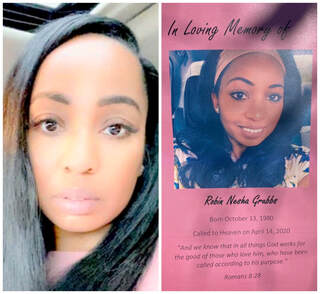 Robin Nesha Grubbs, 39 year-old case manager who died of COVID-19 Robin Nesha Grubbs, 39 year-old case manager who died of COVID-19 In Joe’s opinion, the prison’s COVID-19 response has been disappointing. The staff sent suggestions of how to combat the virus, including locking down the institutions, closing visitations, and providing masks. However, these guidelines failed to be met. As a result, inmates have died, there are several staff on ventilators, and they lost a 39 year-old case manager named Robin Nesha Grubbs, who died from COVID-19 after being denied a mask while working in an isolation unit. One of Joe's biggest frustrations in this battle for proper protection from the virus, is that Congress allocated $100 million for personal protection equipment (PPE) and overtime to the prison system. Despite that money, the only masks they received were made through inmate labor from incredibly thin material which shrivels up after being washed one time. After speaking out and advocating they eventually received acknowledgement that those masks were not adequate, but still did not receive proper alternatives, leaving the prison staff to wonder where the money went. Joe and his colleagues have made some progress and there are currently inspections beginning thanks in part to the congressional support their advocacy has drummed up. Joe went on to say that, unfortunately, he and his colleagues have been fighting injustices from the agency like this for years, even before COVID-19 began.  Black Lives Matter protest in Brooklyn, NY (photos by Laura Fuchs) Black Lives Matter protest in Brooklyn, NY (photos by Laura Fuchs) This week we have been reminded, again, that there are many vital battles to fight. The United States and the world have witnessed more brutal killings of innocent people, and communities are standing up to fight for justice. In light of what is currently happening in our country, outside of COVID-19, we have decided not to release a new interview this week. The injustices and traumas are so pervasive that we must stop what we are doing and take action. This pandemic is far from over, however, in alignment with our mission of supporting those on the front lines, we have decided that there are many front lines and right now we want to support those standing up against social and racial injustice. To honor the fight for justice and the many people who are experiencing persistent and systemic racial inequities every day, we are offering resources which provide information on how to help either through donation or action. Organizations with Vital Information and Options for Donations: Black Lives Matter, which builds power to bring justice, healing and freedom to Black people across the globe. National Association for the Advancement of Colored People (NAACP), whose mission is to secure political, educational, social, and economic equality of rights in order to eliminate race-based discrimination and ensure the health and well-being of all persons. American Civil Liberties Union (ACLU), which exists to preserve and protect the liberties and privileges guaranteed to each individual by the Bill of Rights. These liberties include freedom of speech and expression, equal protection under the law, due process of law, and the right to personal privacy. Color of Change., who design campaigns powerful enough to end practices that unfairly hold Black people back, and champion solutions that move us all forward . Campaign Zero is working on reforming law enforcement policies from the ground up through a comprehensive platform of research-based policy solutions. Funds Seeking Donations: Bail Out Spreadsheet with information about bail out funds listed specifically by location, so that you can find your local affiliates. George Floyd GoFund MeSite ‘I run with Maud’ GoFundMe Site Change.org Petition for Justice for Breonna Taylor Resources for In Person Action: "How to Protest Safely During a Pandemic" (Vice) These protests and this cause are vital, and the call to action to show up for your community is valid; and there is still a virus spreading through our states at the same time, so it’s important to answer that call to action as informed as possible. |
AboutIn Season 1 of Finding the Helpers, we are bringing personal stories of front line staff and families impacted by COVID-19. Our diverse guests will be invited to share their story of being on the front line, and in combination to their story, two expressive art therapists will provide art and creative activities that will support the challenges the individual and their family is facing. These could include ideas for short relaxation techniques to be done on the front line, creative ways to explain in kid friendly terms what is happening, ways to stay connected to family and children during long periods of isolation, etc. Throughout the podcast, conversation will include mental health insight related to the pandemic, anxiety and stress, grief and loss, resiliency, coping skills, and understanding the pandemic. Presented by the nonprofit Playing to Live's, whose history began in 2014 as a grassroots program focused on bringing play and creativity in the midst of the Ebola deadly viruses. Following our work in Ebola, we have continued our work as advocates and creators for play and expression across the globe in refugee settings, post war countries, and in the United States of America.
AuthorLindsay Bingaman is the Regional Program Manager for Playing to Live, based in Nairobi, Kenya. Archives |
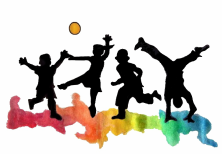
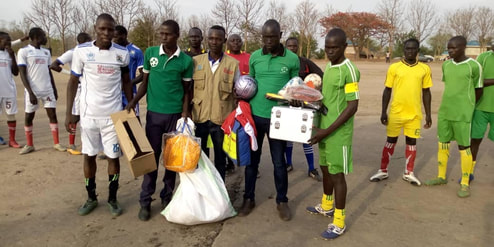
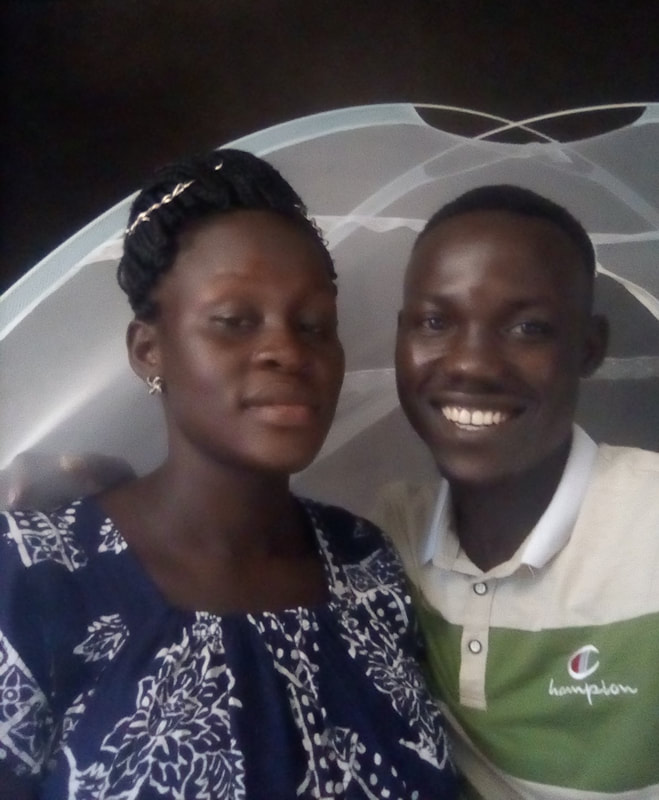
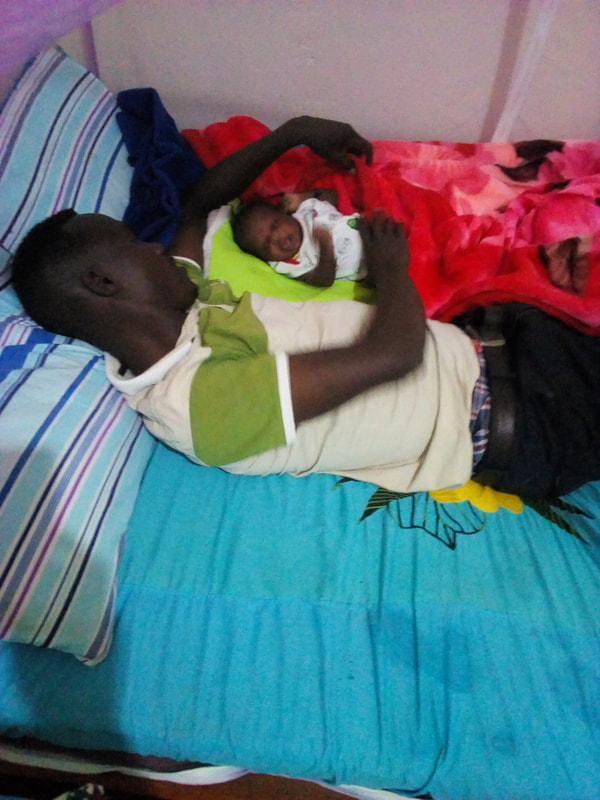
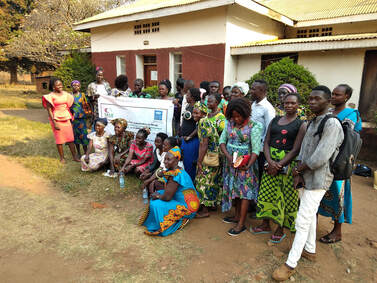
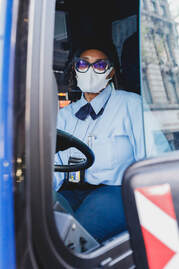

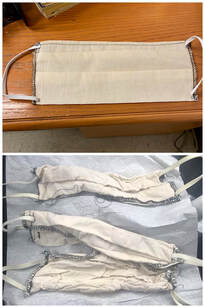
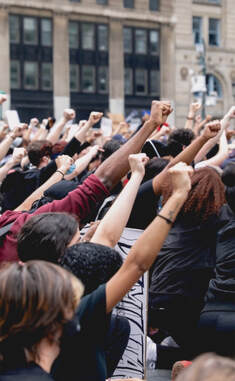
 RSS Feed
RSS Feed